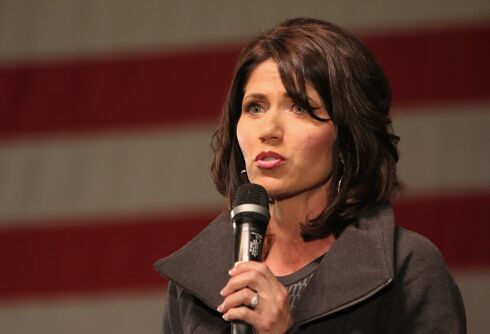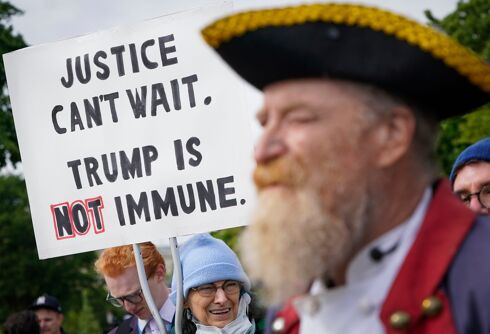In June 1969, the gay rights movement began with blood, fists, broken glass, and thunderous chants.
Since the Stonewall Riots, many have blamed our slow progress on everything from the politics of the Moral Majority to the AIDS epidemic. The newly reinvigorated movement is steaming forward, spearheaded by a push for full marriage equality.
However, it is worth considering how relevant marriage is if even our First Amendment rights are still in question. Some of the most complex legal cases concerning freedom of expression, speech, religion, and the role of government have plaintiffs and defendants who aren’t even old enough to vote. The gay rights movement has moved out of public squares and into public schools.
In the fight for equality, high school has become the new Stonewall.
Never Miss a Beat
Subscribe to our newsletter to stay ahead of the latest LGBTQ+ political news and insights.
Perhaps the easiest question to answer is, “Why?” Why has the First Amendment debate moved from college campuses and into high schools?
It’s a simple lesson in math. When you multiply an increase in out teens by the visibility of gay heroes then divide by more rules, you get First Amendment questions that make you wonder if you’re smarter than a 12th grader.
In the interest of safety and quality education, we give public schools certain latitude with making exceptions and limitations to First Amendment rights. But who decides those limits and on what grounds they are allowed to make them, has become a point of contention.
Even if you only look into the last two years, the volume and intricacy of the disputes faced by children are awe-inspiring.
As you investigate each individual case, the complexity becomes almost overwhelming, as does the pain endured by some of the youngest warriors fighting on the front lines of the battle for equality.
In Chicago, a judge ruled in favor of an anti-gay student who came to school in a “Straight Pride” T-shirt that read “Be Happy, Not Gay.”
The student argued that it was his religious right to promote an opposing view to pro-gay shirts worn by students supporting the “Day of Silence” campaign. In the eyes of the student, the condemnation of gays was the balanced opposition to the support of equality.
In this case, the judge agreed and students in Chicago are once more allowed to wear shirts that oppose homosexuality. Students have continued to wear pro-equality shirts as a public display of support for gay students.
For many, some satisfaction can be drawn from simple displays of protest in the face of negativity. However, satisfaction isn’t so easy for everyone. Many students have faced a punishment far more vicious for simply expressing who they are.
In Mississippi, Ceara Sturgis was erased from her high school yearbook for not conforming to gender norms and wearing a tuxedo in her formal portrait; a motion to dismiss was denied and the case has moved into discovery.
In Mississippi, Constance McMillen lived through the horror that her school canceled prom entirely rather than allow her to bring a same-sex date. This same school had only months earlier repeatedly suspended a male student, Juin Baize, for coming to class dressed as a girl.
McMillen’s case was ruled in her favor and she received damages and changes were made to the school’s rules. Baize was forced to transfer to another school. But, while favorable judgments may be ruled in these cases, a court can offer no real reparation to replace the memories these students were denied.
It isn’t just displays of identity that have been challenged, but words themselves.
Religious watchdogs were outraged when a Wisconsin school paper censored an opinion piece opposing gay adoption rights. Among the criticisms of the piece were references inaccurately stating Jesus’ opposition to homosexuality (in the “New Testament” Jesus makes no reference to homosexuality) and a full printing of the “Leviticus” verse that states that homosexuals should be put to death for their sin.
Christian legal advocates were quick to call this as an infringement of the student’s freedom of religion. The school offered an apology and said it would review its editorial guidelines.
The situation does beg the question, is religious text exempt from being hateful or bullying? Is there no circumstance in which a religious text can be considered as an incitement of violence or a form of persecution?
If opposing homosexuality is protected by religious freedom, what protects promoting equality?
In California, Kearian Giertz was kicked out of a school pageant by an assistant principal for answering the question, “Where do you see yourself in ten years?” by saying he hoped gay marriage would be legal and he’d be married.
And in an Atlanta school, the senior study body president Reuben Lack was removed from office for attempting to change prom court rules to be inclusive of gay students. While the California assistant principal has been reprimanded and the Atlanta teen is challenging his school in court, one has to wonder, what lesson did the schools hope their students would glean from this?
The obvious cynical answer seems to be, “Don’t stand up for equal rights,” and that “Promoting equality makes you unfit for leadership.”
But it isn’t just faculty challenging students. Faculty has also been the source of controversy.
Recently, New Jersey teacher Viki Knox found her tenure in jeopardy after posting on facebook her opposition to a display that included photos of Harvey Milk and Neil Patrick Harris. She cited numerous religious objections to the display and at one point stated, “Homosexuality is a perverted spirit that has existed from the beginning of creation … I know sin and it breeds like cancer!”
Privacy advocates argue that even teachers have a right to personal opinions, but opponents argue that when those opinions enter a public forum, they are subject to review.
No decision has been finalized in the New Jersey case, but it isn’t only what school representatives are saying privately that has been the most outrageous.
In March of this year, two principals resigned amid anti-gay controversies. Iowa Principal Mike Cooper resigned (though he claims for other reasons) after a school assembly went viral on YouTube. In the video, a Christian rock band played music and afterward gave a speech where they railed against the sexual perversion of homosexuality and against abortion. The school paid the band for the appearance.
And Tennessee Principal Dorothy Bond resigned after bluntly telling gay and pregnant students they were going to Hell. Both are examples of Evangelism in public schools and cause us to ask where the moral teaching we ask of our schools crosses the line of the establishment clause.
The examples go on, but the only reason we even know about these cases is because the students have decided that enough is enough and are fighting back. These children have been willing to spend years of their life sitting in court rooms to challenge the laws and policies that would presume to tell them who they are.
Students have used social networking sites like Facebook, Twitter, and Tumblr to organize protests, mobilize parents and communities, and circulate petitions. Kids have used their voices and bodies to stand up for themselves in an unprecedented display to defend their rights. They unequivocally have stood up and said they refused to be silenced.
There has been tremendous and surprising resistance to student voices. The most extreme efforts to silence the pro-gay youth movement are neither created by teachers nor students, but by government.
Minnesota, Tennessee, and Utah are the three strongest examples of anti-gay sentiments being legislated into school policy.
In Michele Bachmann’s district, the local school board pushed through a “Don’t Say Gay” policy that effectively banned schools from addressing homosexuality even in response to direct questions, in relation to verbal or physical violence, or when asked for guidance. In effect, the policy is a denial that homosexuality even exists. The result: Nine gay teens committed suicide in the less than two years it took for local residents to pressure the school board to reverse the policy.
Even in the middle of the outcry and anger over the Minnesota policy, Tennessee and Utah took up similar measures that would have instituted “Don’t Say Gay” legislation statewide. The entire debate caused many to question the role schools play in our society and if schools need to be (or for a point of practicality, can they be?) safe spaces.
“Don’t Say Gay” legislation passed in the Tennessee House but is currently being stalled in the Senate.
The Utah bill, which would have banned any form of sex education or sexual discussion, was vetoed in a surprise move by Utah Governor Herbert. The Governor was condemned as a traitor to the Conservative cause but defended his decision by saying, “I cannot sign a bill that deprives parents of their choice.”
The ultimate question is this: “What do we want our children to learn?”
If you return to the cynical reading of what is being taught by our school systems, you’re left thinking our intention is to teach intolerance, political apathy, and the promotion of religious tradition over progressiveness and equality.
But there is a different reading if you look for the lessons being taught by the bravery of the students. A lesson that begins with the ultimate question any child can ask: “Why?” Why do these children do what they do? Why are they fighting?
If you’re looking for simple answers, it doesn’t get any simpler than this: “They believe they will win.”














Is high school the new Stonewall?